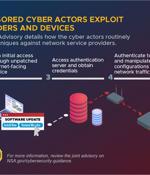Security News

A French-speaking criminal group codenamed OPERA1ER has pulled off more than 30 cyber-heists against telecom organizations and banks across Africa, Asia, and Latin America, stealing upwards of $30 million over four years, according to security researchers. In one robbery, "a network of more than 400 mule subscriber accounts were used to quickly cash out stolen funds mostly done overnight via ATMs," the researchers wrote in a report this month.

Australia's largest telecommunications company Telstra disclosed that it was the victim of a data breach through a third-party, nearly two weeks after Optus reported a breach of its own. "There has been no breach of Telstra's systems," Narelle Devine, the company's chief information security officer for the Asia Pacific region, said.

Australian telecom giant Optus on Monday confirmed that nearly 2.1 million of its current and former customers suffered a leak of their personal information and at least one form of identification number as a result of a data breach late last month. "Approximately 1.2 million customers have had at least one number from a current and valid form of identification, and personal information, compromised," Singtel said in an announcement made on its website.

The U.S. Federal Communications Commission has added Pacific Network Corp, along with its subsidiary ComNet LLC, and China Unicom Operations Limited, to the list of communications equipment and services that have been deemed a threat to national security. The agency said the companies are subject to the Chinese government's exploitation, influence, and control, and could be forced to comply with requests for intercepting and misrouting communications, without the ability to challenge such requests.

A threat cluster linked to the Russian nation-state actor tracked as Sandworm has continued its targeting of Ukraine with commodity malware by masquerading as telecom providers, new findings show. Recorded Future said it discovered new infrastructure belonging to UAC-0113 that mimics operators like Datagroup and EuroTransTelecom to deliver payloads such as Colibri loader and Warzone RAT. The attacks are said to be an expansion of the same campaign that previously distributed DCRat using phishing emails with legal aid-themed lures against providers of telecommunications in Ukraine.

Since 2020, Chinese state-sponsored threat actors have operated large attack campaigns exploiting publicly identified security vulnerabilities. In these campaigns, the attackers receive valid account access by exploiting Virtual Private Network vulnerabilities or other Internet-facing services without using their own distinctive or identifying malware, making it harder for threat intelligence analysts to evaluate the threat.

U.S. cybersecurity and intelligence agencies have warned about China-based state-sponsored cyber actors leveraging network vulnerabilities to exploit public and private sector organizations since at least 2020. The widespread intrusion campaigns aim to exploit publicly identified security flaws in network devices such as Small Office/Home Office routers and Network Attached Storage devices with the goal of gaining deeper access to victim networks.

A Chinese-aligned cyberespionage group has been observed striking the telecommunication sector in Central Asia with versions of malware such as ShadowPad and PlugX. Cybersecurity firm SentinelOne tied the intrusions to an actor it tracks under the name "Moshen Dragon," with tactical overlaps between the collective and another threat group referred to as Nomad Panda. ShadowPad, labeled a "Masterpiece of privately sold malware in Chinese espionage," emerged as a successor to PlugX in 2015, even as variants of the latter have continually popped up as part of different campaigns associated with Chinese threat actors.

The U.S. Federal Communications Commission on Friday moved to add Russian cybersecurity company Kaspersky Lab to the "Covered List" of companies that pose an "Unacceptable risk to the national security" of the country. Also added alongside Kaspersky were China Telecom Corp and China Mobile International USA. The block list includes information security products, solutions, and services supplied, directly or indirectly, by the company or any of its predecessors, successors, parents, subsidiaries, or affiliates.

The United Stations Federal Communications Commission has labelled Kaspersky, China Mobile, and China Telecom as threats to national security. Kaspersky is the first non-Chinese company to be added to the FCC's list, but the agency did not tie its decision to Russia's illegal invasion of Ukraine.